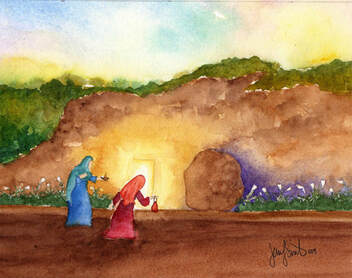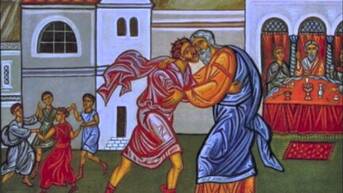
It was dark outside, early dawn in fact, when they got up, that group of women which included Mary Magdalene, Joanna, Mary the mother of James, and other women, women Jesus healed, and women from whom had exorcised demons. Women Jesus loved and treated with respect. In turn these women loved Jesus and stayed faithful to him to the end. As Jesus carried his cross to Calvary, the women accompanied him. They stood watch as Jesus suffered and died, never turning away, even though others did.
So at early dawn on that third day, the first opportunity they had, that the women prepared the spices to take to Jesus’ tomb and anoint his dead body.
At dawn they found the stone rolled away from the tomb. At dawn they went in the burial cave and didn’t find the body. They were perplexed. Interestingly, this is the same word used by Mary, the Mother of Jesus, when she was perplexed and didn’t understand the Angel Gabriel’s greeting, bringing her news of the conception of a new, Holy life. So the women are perplexed as these signs of new, resurrected life that they too don’t yet understand.
At dawn the women encounter two men-like angels in dazzling clothes. These two men/angels are the dawn speakers, for they proclaim: “Why do you seek the living among the dead? He is not here, but has risen.” They remind the women of Jesus’ prophetic words in Galilee that he would suffer and die, but rise again. At dawn, the women do indeed remember, and run to tell the rest. The others, roused from their sleep so early, believe this an idle tale, but Peter ran to the tomb and was amazed to see the linen cloths but no body there. All at dawn.
Dawn is a special time of day. Not night anymore, not quite day, it is an in between time, an in-between place. Darkness is giving way to light, but the mix of the two is there. The world for the most part is still quiet, only a few are awake. Some of us find getting up extra early at dawn to be rewarding. It is a perfect time to get a head start, to meditate, exercise, pray, attend to a special project without the disruptions of daytime busyness, while the quiet of the night lingers.
In the scriptures dawn was a time of spiritual significance, commitment and renewal. Job made it a regular practice to worship God early in the morning (Job 1:5). Such also probably was Joshua’s custom (Josh. 3:1; 6:12; 7:14, 16; 8:10). Indeed, when crucial decisions were to be made or important activities needed to be accomplished, it is often reported that godly people in times of trouble rose early to pray and be with God. When Abraham was tested to sacrifice Isaac. When God called Moses called to ratify the covenant. When God called Gideon to be a judge over Israel. When Samuel’s parents, prayed for a longed-for child. The prophet Jeremiah and King Hezekiah of Judah rose early to address their problems and worries with God (Gen. 22:3; Exod. 24:4; Judges 6:35; 2 Chron. 29:20, Jeremiah 7:13, 1 Sam 1:19). The psalms repeatedly talk about dawn as a time of prayer and encounter with God, as Psalm 5 reminds us: “In the morning O Lord, you hear my voice, in the morning I lay my requests before you and wait in expectation.” (Pss. 5:3; 88:13, Pss. 59:16; 90:2, Ps. 49, Ps. 143:8 Ps. 92:1-2). It is not surprising then that the gospels remind us that Jesus got up in the morning, while it was still dark, and went to a solitary place to pray (Mark 1:35). So we too are called to Dawn.
Dawn symbolizes not only darkness giving way to light, but the old making way for the new, fresh beginnings. For believers, dawn symbolized an eager desire to meet the Lord, serve God, and live in accordance to God’s will. It is not surprising then that even the word, Easter, is derived from the root-word for Dawn. Today we celebration dawn. The divine dawning of God’s holy light in the resurrection of Christ Jesus.
We need the dawn. There are places in the world, where on this Easter Sunday has shadows of Good Friday clings to our hearts. We wonder, where is the dawn in a world filled with conflict, suffering and war? Yet Easter is strong enough to handle all the pain, all the doubt, all the hurt in our hearts. As dawn surely follows the night, Easter rises from the ashes of pain and sorrow.
Easter is our reminder that Jesus rises in our darkness, shows us life in the scarred places and leads us to new possibilities. However, Easter proclaims that a new life, unknown is on the horizon and beckons us forward…where Jesus is – in resurrection glory. That the place of Dawn.
Like those women who came to the tomb in the early dawn, let us not be afraid. It is Easter. Because we see the dawn. At some place on this good earth, it is dawn. It is always dawning.
If we follow the example of the faithful we will see: dawn always approaches. A stone rolled away. An empty tomb. Linens by themselves. The angels’ message: He is risen. It is Easter, and no matter where our lives are, dawn will find us. Remember Jesus’ words. His promise. Because Jesus is risen.
He is risen indeed. And so will we.
Amen.

 RSS Feed
RSS Feed